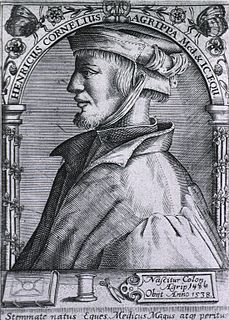A Quote by Henry David Thoreau
How little do the most wonderful inventions of modern times detain us. They insult nature. Every machine, or particular application, seems a slight outrage against universal laws.
Related Quotes
Magic is a faculty of wonderful virtue, full of most high mysteries, containing the most profound contemplation of most secret things, together with the nature, power, quality, substance and virtues thereof, as also the knowledge of whole Nature, and it doth instruct us concerning the differing and agreement of things amongst themselves, whence it produceth its wonderful effects, by uniting the virtues of things through the application of them one to the other.
In the course of evolution nature has gone to endless trouble to see that every individual is unlike every other individual....Physically and mentally, each one of us is unique. Any culture which, in the interests of efficiency or in the name of some political or religious dogma, seeks to standardize the human individual, commits an outrage against man's biological nature.
Yoga is a science, and not a vague dreamy drifting or imagining. It is an applied science, a systematized collection of laws applied to bring about a definite end. It takes up the laws of psychology, applicable to the unfolding of the whole consciousness of man on every plane, in every world, and applies those rationally in a particular case. This rational application of the laws of unfolding consciousness acts exactly on the same principles that you see applied around you every day in other departments of science.
If the world is an aggregate of relatively independent regions, then any assumption of universal laws is false and a demand for universal norms tyrannical: only brute force (or seductive deception) can then bend the different moralities so that they fit the prescriptions of a single ethical system. And indeed, the idea of universal laws of nature and society arose in connection with a life-and-death battle: the battle that gave Zeus the power over the Titans and all other gods and thus turned his laws into the laws of the universe.
The assumption that the laws of nature are eternal is a vestige of the Christian belief system that informed the early postulates of modern science in the seventeenth century. Perhaps the laws of nature have actually evolved along with nature itself, and perhaps they are still evolving. Or perhaps they are not laws at all, but more like habits.
In a society of little economic development, universal inactivity accompanies universal poverty. You survive not by struggling against nature, or by increasing production, or by relentless labor; instead you survive by expending as little energy as possible, by striving constantly to achieve a state of immobility.
Perchance, coming generations will not abide the dissolution of the globe, but, availing themselves of future inventions in aerial locomotion, and the navigation of space, the entire race may migrate from the earth, to settle some vacant and more western planet.... It took but little art, a simple application of natural laws, a canoe, a paddle, and a sail of matting, to people the isles of the Pacific, and a little more will people the shining isles of space. Do we not see in the firmament the lights carried along the shore by night, as Columbus did? Let us not despair or mutiny.
The preservation of parks, wilderness, and wildlife has also aided liberty by keeping alive the 19th century sense of adventure and awe with which our forefathers greeted the American West. Many laws protecting environmental quality have promoted liberty by securing property against the destructive trespass of pollution. In our own time, the nearly universal appreciation of these preserved landscapes, restored waters, and cleaner air through outdoor recreation is a modern expression of our freedom and leisure to enjoy the wonderful life that generations past have built for us.
The Laws of Nature are just, but terrible. There is no weak mercy in them. Cause and consequence are inseparable and inevitable. The elements have no forbearance. The fire burns, the water drowns, the air consumes, the earth buries. And perhaps it would be well for our race if the punishment of crimes against the Laws of Man were as inevitable as the punishment of crimes against the Laws of Nature -were Man as unerring in his judgments as Nature.
I like sometimes to take rank hold on life and spend my day more as the animals do. Perhaps I have owed to this employment and tohunting, when quite young, my closest acquaintance with Nature. They early introduce us to and detain us in scenery with which otherwise, at that age, we should have little acquaintance.

































